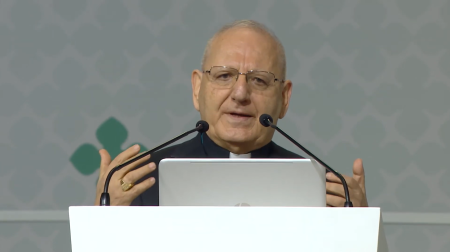Iraqi Christians fear president’s revocation of decree places them in harm’s way

Christians in Iraq protested a decision by Iraqi President Abdul Latif Rashid to withdraw a decade-old decree recognizing Chaldean Patriarch Cardinal Louis Raphael Sako as the head of the Chaldean Church "in Iraq and the world" and allowing him to legally protect the assets of Christians and the local church.
On July 3, according to Rudaw English, Rashid revoked special presidential decree 147, issued by late president Jalal Talabani in 2013. In addition to officially recognizing Sako as the head of the Chaldean Church, the oldest Christian community in Iraq, the decree reportedly granted him powers to administer Chaldean endowment affairs.
Rashid was allegedly inspired to revoke the decree by Rayan al-Kildani, the leader of the nominally Christian Babylon Movement, a party and militia affiliated with the pro-Iran Popular Mobilization Forces and the Islamic Revolutionary Guard Corps, Rudaw English said.
In a statement, the Iraqi presidency pushed back on claims that repealing the decree targeted a specific person.
"There is no doubt that religious institutions do not function as government agencies. Clerics who are assigned to these tasks are not considered state employees for the purposes of issuing a decree appointing them," the statement reads.
"Nonetheless, the abolition of Presidential Decree No. 147 of 2013 is intended to correct the situation and does not have any other implications."
Sako is well-known for speaking out and attracting international attention to the plight of Christians in Iraq as Islamic State forces ravaged the country and forced half of the 1 million strong Iraqi Catholic Community to flee persecution from extremist Sunni forces.
Critics of decree 147's revocation worry that the decision is a pretext to take over what Christians have left in the country.
"This is a political maneuver to seize the remainder of what Christians have left in Iraq and Baghdad and to expel them. Unfortunately, this is a blatant targeting of the Christians and a threat to their rights," Diya Butrus Slewa, a leading human and minority rights activist from Ainkawa, a Christian-majority district at the northern edge of Erbil, where residents protested in front of the Cathedral of Saint Joseph on Thursday morning.
"From the beginning of the Church, Christian affairs are administered by the Church. The Church has its own laws, courts, and committees," Slewa explained. "We hope the Iraqi presidency hears our people and revokes this [decision] as soon as possible, otherwise it will become an international matter and the Vatican will get involved."
A statement from Rashid's office noted the Sako did not need a decree to be recognized as the leader of the local Catholic Church as "he is appointed by the Apostolic See."
"Withdrawing the republican decree does not prejudice the religious or legal status of Cardinal Louis Sako, as he is appointed by the Apostolic See," the statement said, adding that the patriarch continues to enjoy "the respect and appreciation of the presidency of the Republic as Patriarch of the Chaldean Church in Iraq and the world."
Emad Hanna, an elderly man who protested in Ainkawa, told the Erbile-based Rudaw that it is Kildani's militia that put pressure on Rashid to revoke the decree.
"What else can I say? This is a clear violation and there is no doubt about that. What the president of the republic has done is clearly under political pressure from a militia group who it is a disgrace to even call Christian and say that they represent our peaceful community," Hanna said.
"I feel ashamed that I have to waste my breath talking about them. The fact that this has happened is a complete disgrace."
Contact: leonardo.blair@christianpost.com Follow Leonardo Blair on Twitter: @leoblair Follow Leonardo Blair on Facebook: LeoBlairChristianPost





















